This was the year of the black hole of the heart.
While years past were challenging, 2010 felt impossible. It has been the worst year of my life. There is now less than a week to go; and if we are lucky in 2011, we are all the closer to the end of the world. I say this in kindness given the problems we have on the planet that are not going away soon enough: we are losing species at a phenomenal rate, and the lose of other species does not, in turn, bode well for our human prospects. The corporation, a behemoth of destruction, is sorely in need of a legal definition that places greater stricture on its behavior. Capitalist greed may need no further comment than what Michael Moore has already said.
The degradation of my personal inner life, however, is all I really have with which to work. That may sound like a retreat or a little too Buddhistic, but homelessness does cast one's life in its legimitate light of powerlessness over anything in the vast Otherness we confront every day. Of course, there are demands on us all from the Outside. One homeless friend constantly reminds me that I am here to work.
Now that is really ugly and demeaning because I grew up in the once-prosperous middle class from which I might make anything of myself, go anywhere, and do anything in a world of endless possibilities; but my friend's comment stinks to high heaven of Truth. There is no religion, either, that does not command we have something to do and contribute; and that is fair enough.
However, our world recently metamorphosed in a way few of us yet understand. The world is both larger and smaller at the same time. The Emerging Economies are quickly surpassing the First World in financial prospects, though our stock market is as high in volume as it ever was, despite record numbers of homeless and jobless people. Technology is produced in many parts of the world and creates a common language through the internet while access to simple necessities such as food is dwindling. (Food free of genetically-modified organisms may soon be a thing of the past.) The Good is great and the Bad is horror beyond the scope of imagination.
Driven nearly mad by my circumstance, I determined to get out as soon as possible. The nightmare of overwhelming grief that was waking me consistently out of almost every sleep had me thinking about the storage space to which I have access. The renter who lends me space there built in a heavy dowel overhead to hold clothing, quite a reach, but sturdy nonetheless. How easy it would be to buy rope, though I would have to consult the internet on making a noose and the details of how the deed is carried out most effectively.
I knew I was in trouble.
After one particularly bad night, I was confronted by a co-worker the next day with whether or not I believed in God because she needed to tell someone what had happened to her. She outlined a quite miraculous event in which desperate prayer had saved her from immediate disaster. It was a beautiful story. I cried because that story had just saved me from the deadly plot I had been hatching all morning. I have not since had the same degree of compulsion or decisiveness.
Within a day or so, I received a notice that I had been accepted into the Homeless Prevention and Rapid Re-housing Program and was expected to find a place to live within its guidelines in a month's time. It was numbing, and I cannot account for the feelings of ambivalence that notice evoked in me, like a joke that is no longer funny and will not elicit even a smile. I had been through hoop after hoop of fire searching for programs by internet and telephone, filling out program paperwork, interviewing with program managers and case workers, and enduring administrative delays. I was one of thousands of worthy people who needed help, even if, like me, they all felt alone in the world and as though a mountain were going to drop on them.
There is a tremendous sense of dread that comes with homelessness, and it is not entirely in one's own mind. The behavior of the police toward the homeless is a huge factor as they have the authority to make sure a homeless person can never get up again. It is simply too much power over another person's life. (I have detailed here at Vagabond several incidences of police disregard and destruction over the months I have been writing.)
Meanwhile, the general public is convinced that homeless people are dangerous, and one of the lowest accusations is that homeless men are rapists. I do not particularly like homeless men because the ones I have met seldom bathe and smell badly; but these are the most offensive things I have ever encountered. Many do not eat or do not eat well, nor do they get sufficient rest sleeping on the ground; and many drink or do drugs that rather serve to suppress normal desire. The reality is that these men would not have the strength to chase or nab a woman and would not be capable of the physical act of rape. They tend to sleep or lie about whenever they can. Many like to read books or listen to the radio. Some visit the local library to use the internet. Homeless men are far from being anyone's worst dream.
Nonetheless, the mythology of the homeless perpetuates ugly stereotypes that keep them from receiving the compassion and real services they need for support if they are ever to get off the street. The mythology also keeps the police busy when there is apparently nothing else for them to do. For example, rookie cops are often broken in with the harassment of a homeless person, waking him up, shaking him down, handcuffing him, putting him in the police car, and driving him to jail where he stays several nights before being let out because there is no reason to hold him. And this is routine.
The good cop/bad cop game is played out, too. The police have their own version of homeless prevention, called the Homeless Outreach Team (HOT). I have placed several phone calls to this group in the hopes of learning what they do and what they might be able to do for me, as I have left no stone unturned. My calls were never answered, despite assurances by beat police that the Team would respond. I have seen the HOT van parked here and there and have seen it pass by on the street, but I cannot tell you after all this time what HOT does or is supposed to be doing.
Perhaps the worse blow to any homeless person is losing all your friends, as that will eventually happen. No one can bear to hear homeless stories every time they phone to inquire about you, and few housed people have the kind of economic security that seemed to be the right of every American just a few years ago. The crushing weight of the homeless person's fears, depression, isolation, and hopelessness take a toll on even the best of friends. There is little left in common in fact as one's homeless life is an unshared bare-bones existence.
As for family, few people can tolerate the expectations engendered by this institution under normal conditions, much less the judgments and sense of failure evoked by a straightforward admission of the truth of one's situation. I would have considered the noose sooner than I did. It is not easy, all the same, sugar-coating one's life for family consumption. So far as anyone knows, we are all just fine, and all the usual normative assumptions, that is, that we all have a place to live and eat reasonably well and so on, hold true.
That homelessness is an unshared life is perhaps the most tragic outcome. Many people have a fictionalized version of homelessness in mind, as I did when I first decided to live in my truck. We were not hopping trains with Woody Guthrie; and far from sitting around the campfire at night, we scattered each to our own hidey-holes, places where the police were not likely to find us. We could not congregate for fear of calling attention to ourselves; and it is against the law to sleep in one's vehicle, even to nap in broad daylight. Just like prison camp interns, the homeless have a near-complete isolation from the rest of the world and little sense of home. The reality of being constantly watched by police, because they guard the streets in their cars round the clock, cut off most avenues of fellowship.
Of course, my life is different now; and without any conscious effort, I am dissociating from homelessness. I have little desire to go back and visit the homeless people I knew, not because I now eschew that kind of life, but because we could not manage to build that commonality like neighbors in the usual sense would do. As much as we had in common, it would never translate into lasting friendships.
And what would I say? I am not yet sure my life is better, and those I now meet in a more normative setting are far from better people. The homeless are honest, unspoiled, and realistic, not out of virtue, but because their poverty and status as non-citizens makes them so.
The terror of homelessness must run deep in the human psyche. There may be collective memories spanning centuries of losing our homes to marauders and war parties that reached our villages. Whatever the case, as a society, we seem to need to turn our backs on the homeless and deny with every fiber of our being the reality that we have no right or guarantee to a place to live. There is no inalienable right to a home in the Constitution of the United States, a nation missing an essential building block, built without a foundation, when seen in this light. In God We Trust takes on new meaning here as the only home we possess we owe only to an inner spiritual sense that there is a better world somewhere beyond this one.
We are all fundamentally homeless, dependent upon the mercy of someone higher up on the food chain who employs us. Our human culture is pyramidal, that is, many people supporting a few at the top, no matter whether the country is capitalist or communist. What we learn from the symbolism of the pyramids in Egypt or in Mexico is that the pyramid as a structure is unstable. All lost cultures modeled on the pyramid now lie in ruins; and there may be no end to the exploitation of people and other living things until this structure is consigned to the past.
Our hopes lie in the circle of life.
* Note: Writing was begun on December 26, 2010, and completed on February 13, 2011.
Hello world!
-
Welcome to WordPress. This is your first post. Edit or delete it, then
start writing!
The post Hello world! appeared first on UG2882.





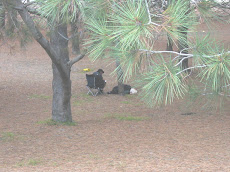


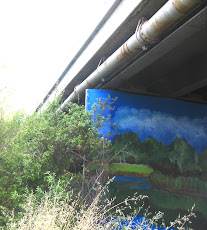
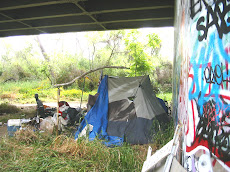







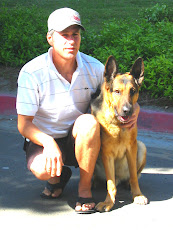
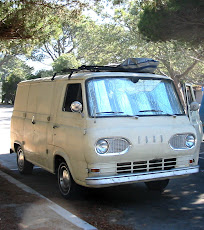
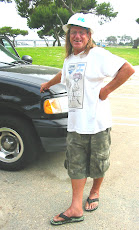









Hi Kerry: I'm glad to see that you are blogging again! I stumbled upon your blog a couple months ago, and was very impressed by your eloquent posts regarding the human condition in general and homelessness (which I, too, am experiencing) in particular.
ReplyDeleteIt sounds like you have gained some sort of housing, but I hope you will continue to share your insights via this blog.
Best regards,
Dan
It has been interesting to see how your perspective has changed from, "homelessness can be good for you," to this post.I think Dan speaks for all of us who read this blog.
ReplyDeleteI want to thank you, Dan and Anonyous, for keeping me company here at Vagabond. Life is still lonely, and I still have a mountain in front of me to climb. I fall far short of having a happy and full life, even though I am now housed, and I no longer see through the lens of the illusions of the middle class.
ReplyDeleteWhen one is homeless, one must find ways to live with the circumstances. I did my best to survive, especially psychologically. If I seemed sanguine at all while living in my truck, it was because I was forced to exert extraordinary effort to stay sane.
Housing has made a difference primarily in the level of stress, which I had always to ignore when I was homeless. I do not have to worry about who is around, who is looking, and where the cops are.
I will continue to write here about my experience, as I believe I was just among the first wave of people to find themselves in the street. There is a storm looming in this country, and I am sure you see it coming.
Kerry, I too am glad to see you are still writing, and I am very glad you did not use that rope and storage unit. I've been at that edge myself, and am grateful for the time after...but during the despair it does seem very logical to take a quick exit. (It is no longer an option for me, I think, and I have learned to monitor those things that might cause a slip).
ReplyDeleteSnowing here in far, far northern California. A lot of people are pretty cold, I've been giving out warm gear. It's not enough.
Hello, jarvenpa, and thank you for your solicitations. I am not out of the woods yet. I am still just surviving, but I am looking for some way to begin to contribute more along the lines of the matters that concern me most: genetically-modified food, the political polarization in our country, corporate power, and the Patriot Act. (I have been hearing about mysterious arrests being made. Very creepy.)
ReplyDeletePlease feel free to drop a line here whenever you wish.
Kerry
Oh Kerry, I'm so glad you're back. I tried sending you a couple of email because your last post had me worried. Having spent so much time there myself I was hoping you'd find strength to resist. But I worried. I'm so glad you did find the strength, because to be honest as bad as the world is getting, it's a better place with you here. And yes, I get the distinction between housed but still so limited by what our lives throw at us.
ReplyDeleteI'm glad you're back. And so relieved that you're still with us.
Sam